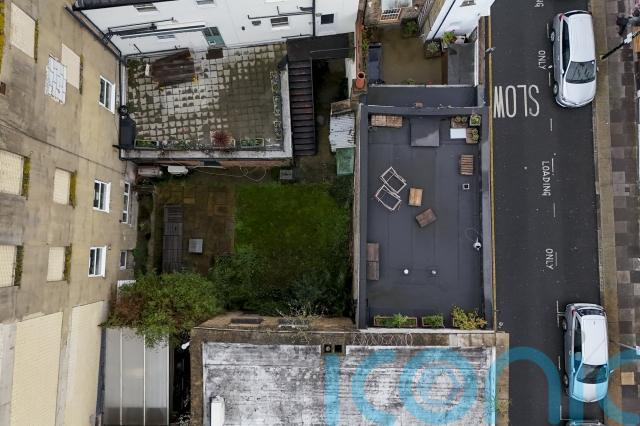
The daughter of Muriel McKay, who was kidnapped and murdered more than 55 years ago and whose remains have never been found, said the Metropolitan Police “don’t want to know” about her mother’s case.
A High Court judge ruled on Tuesday that the family cannot perform a radar scan of a shared back garden in east London where they believe she is buried.
Ms McKay, the wealthy wife of newspaper executive Alick McKay, was kidnapped for a £1 million ransom in 1969 after being mistaken for Anna Murdoch, the then-wife of media mogul Rupert Murdoch.
On Monday, barristers for two of her children, Ian McKay and Dianne Levinson, asked a judge to order that the homeowners of two neighbouring properties on Bethnal Green Road allow them to conduct a “ground-penetrating radar survey” of a shared back garden.

The hearing in London was told that the family now believe Ms McKay’s remains are buried at the site, following new information coming to light.
Ms Levinson said it was “deeply disappointing” that the Met Police were not more involved in the case.
Speaking at a press conference on Tuesday evening, she said: “The information is incredibly, incredibly convincing and compelling, and the police do not want to know.”
She added: “They’re going to look a bit silly if we do dig her up and we do find my mother, because they rejected this information three years ago.”
The Metropolitan Police has been approached for comment.
One of the homeowners, Madeleine Higson, opposed the injunction bid, which would have stopped her and the owner of the other property, Janis Cross, from disturbing the garden.
Barristers for Ms Higson said she had been subjected to “borderline harassment” and caused “significant distress” by the McKay family, who it was claimed had repeatedly attempted to gain access to the property through false representations.
Ms Higson said there had been “countless attempts” by the family “to bully their way into my home”.
In a ruling on Tuesday, Mr Justice Richard Smith said the “evidence of the presence of Muriel McKay’s remains at the premises, such as it is presently, seems thin”.
Concluding his judgment, the judge said he would have also refused the injunction on the basis of “egregious conduct” towards Ms Higson from Ms McKay’s family, including her grandson, Mark Dyer.
He added that this included “threats, deception, dishonesty, lies, bullying and harassment”.
Mr Dyer said this was a “complete exaggeration”, adding: “It’s a cheap shot at us to win the narrative and there’s no evidence to that.”
Responding to the comments at the press conference, Mr Dyer said: “We’ve always behaved very well. We’re not a bunch of yobbos – we’re civil people.”
Ms Higson said in July this year, a man who identified himself as “Ricardo” asked to enter the garden to make a “sentimental montage” for his grandfather, who, it was claimed, used to live in the house.
“Ricardo” then contacted Ms Higson again, claiming that he was buying a nearby property and needed further access to the garden to conduct a radar survey to assess “drainage issues”.
Mr Dyer told the press conference that “maybe our chap shouldn’t have used any subterfuge”.
He added that the search would involve “a couple of old boys with a scanning machine to go in the backyard for two or three hours”.
In a statement responding to the judgment, Ms Higson said she was “grateful” for the court’s decision.
She added: “Whilst, as always, I wish to reiterate my sympathy for the plight of the family, I am grateful that they have been held to account for their behaviour, which was described by the judge as ‘appalling’, ‘immoral’ and ‘unlawful’ and involved ‘threats, deception, bullying and harassment’.
“As I have stated from the outset, should the police unearth credible evidence which causes them to believe (unlike they do now), that there is a need to investigate my home, I will cooperate fully with them as the appropriate parties to undertake such an investigation.”
She added: “I am a young, working woman who at every point in this horrible situation strived to behave kindly, lawfully and discreetly despite being treated in the exact opposite manner.”
Ms McKay, 55, was taken from her home in Wimbledon, south London, on December 29 1969.
Brothers Arthur and Nizamodeen Hosein were later arrested and found guilty of her murder, and sentenced to 25 years and 15 years in prison, in one of the first murder cases to be brought without a body.
The court heard on Monday that the injunction bid came after the family received new information from a woman called Hayley Frais, whose father ran a tailor shop at the premises on Bethnal Green Lane at the time of the killing, where Arthur Hosein was employed.
Benjamin Wood, for Mr McKay and Ms Levinson, said Ms Frais had claimed that her father said on his deathbed that he noticed a strong smell at the premises at the time of Ms McKay’s disappearance.
Mr Wood added that the police were not willing to excavate or survey the garden as it did not meet their “evidential threshold”, but were “receptive to information” coming from any scan.
Subscribe or register today to discover more from DonegalLive.ie
Buy the e-paper of the Donegal Democrat, Donegal People's Press, Donegal Post and Inish Times here for instant access to Donegal's premier news titles.
Keep up with the latest news from Donegal with our daily newsletter featuring the most important stories of the day delivered to your inbox every evening at 5pm.